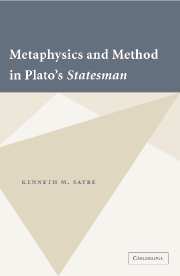Book contents
- Frontmatter
- Contents
- Acknowledgments
- Introduction
- PART I METHOD
- PART II METAPHYSICS
- 7 Excess and Deficiency in General
- 8 The Great and the Small in Plato's Dialogues
- 9 The Generation of Everything Good and Fair
- 10 Accuracy in the Art of Dialectic
- 11 Division According to Forms
- 12 The Metaphysics of Division
- Appendix: Equivalents for the Great and the Small in Aristotle and His Commentators
- Bibliography
- Index Locorum
- Index of Names
- General Index
9 - The Generation of Everything Good and Fair
Published online by Cambridge University Press: 23 November 2009
- Frontmatter
- Contents
- Acknowledgments
- Introduction
- PART I METHOD
- PART II METAPHYSICS
- 7 Excess and Deficiency in General
- 8 The Great and the Small in Plato's Dialogues
- 9 The Generation of Everything Good and Fair
- 10 Accuracy in the Art of Dialectic
- 11 Division According to Forms
- 12 The Metaphysics of Division
- Appendix: Equivalents for the Great and the Small in Aristotle and His Commentators
- Bibliography
- Index Locorum
- Index of Names
- General Index
Summary
Return to the Problems of Chapter 7
Anticipating that YS might come to consider their definition of weaving too long, the Stranger attempts to forestall such misgivings by undertaking an examination of Excess and Deficiency in general. He begins this examination by distinguishing two kinds of measurement, which he proceeds to describe in a variety of alternative formulations. In our initial encounter with these alternative descriptions (in Chapter 7), we found them sufficiently diverse to raise doubts about the nature of the intended distinction. In hopes of resolving these doubts, we undertook a brief survey of other relevant contexts employing the same terminology, looking first at Aristotle and his later Greek commentators (section 7.2) and then at other dialogues written roughly at the time of the Statesman (Chapter 8). It is time to return to the problems raised by these diverse formulations.
While the reader may want to refer to the translations provided in Chapter 7 for details, it will be helpful to have a summary of these formulations at hand.
In formulation (1), the first kind of measurement is said to concern the association of greatness and smallness with each other, whereas the second is said to engage a being that is necessary for generation.
In formulation (2), the first compares the larger and the smaller with each other exclusively, whereas the second involves comparison with the condition of due measure (which is chiefly responsible for the difference between bad and good in human affairs).
In formulation (3), the first has to do with the fact that the Great and the Small both exist and are judged relative to each other, whereas the second pertains to their existing and being judged relative to due measure.
[…]
- Type
- Chapter
- Information
- Metaphysics and Method in Plato's Statesman , pp. 171 - 190Publisher: Cambridge University PressPrint publication year: 2006



